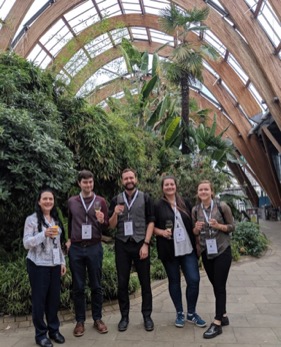My research focuses on developing a gene therapy treatment for thrombotic thrombocytopaenic purpura (TTP), a rare (~1/200,000 people) but life-threatening clotting disease caused by inherited or acquired deficiencies in a protease called ADAMTS13. In the plasma, ADAMTS13 has an important role to regulate the size of glycoprotein von Willebrand factor (VWF), preventing the accumulation of large thrombogenic VWF multimers. TTP patients can experience a spontaneous, wide-spread accumulation of thrombi within the microvasculature which without treatment causes organ failure and death in 90% of acute events.
Individuals with TTP receive regular plasma infusions, however despite current treatments reducing mortality rates, high treatment burden and morbidity associated with donor-derived plasma warrants the development of a novel therapy for TTP. Gene therapy offers an alternative treatment which could prevent the onset of life-threatening acute TTP episodes. Research I am conducting during my PhD at Imperial College London will investigate whether lentiviral-mediated pulmonary gene therapy could be a potential treatment for TTP.
 BSGCT Annual Conference 2019, Sheffield. Networking drinks reception held at the spectacular Sheffield Winter Gardens.
BSGCT Annual Conference 2019, Sheffield. Networking drinks reception held at the spectacular Sheffield Winter Gardens.
I was fortunate to present my research at the British Society of Gene and Cell Therapy (BSGCT) annual conference in Sheffield on the 19th-21st June. My research thus far entails characterising ADAMTS13 knockout mice to determine suitable biomarkers (e.g. platelet and plasma ADAMTS13 levels) and designing and establishing assays to test efficacy of gene transfer. Future work will assess the restoration of plasma ADAMTS13 function in knockout mice and protection against TTP-like symptoms.
It was a fantastic experience to attend the three-day BSGCT conference and to gain the opportunity to present alongside well-known researchers. There was a real sense of excitement as speakers reflected upon the progress of the gene and cell therapy field. Of note, Imran Kausar from AveXis showed us the successes of recently licenced AAV9 gene therapy product, Zolgensma, which has demonstrated dramatic effects in the treatment of devastating childhood disease, Spinal Muscular Atrophy (SMA). Another stand-out talk included keynote speaker Stephan Grupp from Children’s Hospital of Philadelphia, who gave a fascinating insight into the translation of licenced cell therapy, Kymriah by Novartis, the first chimeric antigen receptor (CAR)- T cell immunotherapy approved in the US for the treatment of B-cell acute lymphoblastic leukaemia in children and young adults.
After three full days of talks, panel discussions and networking, I was delighted to hear that I was the winner of BSGCT best Oral Presentation, sponsored by the ESGCT. I am extremely grateful to the ESGCT for this generous award and the opportunity to share my research at the BSGCT conference. I look forward to next year’s joint BSGCT Annual Conference and ESGCT Annual Congress in Edinburgh!